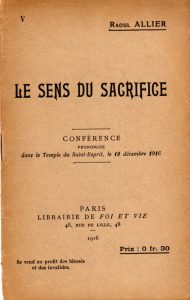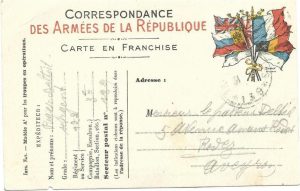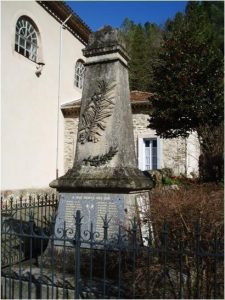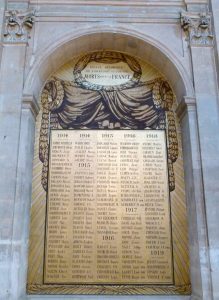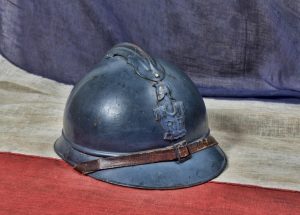Weakened communities
The mobilization emptied the countryside of its men. Protestant communities were only composed of children, women and elderly people. Some villages lost their only parish pastor, gone to the front, thus many Protestant communities in France were in distress.
The reduction in attendance caused many operational problems within ecclesial institutions who were left idling or disappeared. Some parishes continued living a crisis that had started before the war, while others were victims. For instance in Chateauneuf-sur-Charente (Charente) ‘all male members, except the president, were mobilized or precluded’, as written in the register of the presbyterial council in 1917 and 1918, which meant that no meeting could take place. The decrease in finances caused a Protestant school in Pont-Menou (Finistère) to close down in 1916, which delighted the Catholic rector of the parish.
Renewing itself to live on
Confronted with these hardships Churches had to adapt to replace missing people. Whenever possible a new organisation of human resources allowed worship to continue locally. Pastors who were still in their parishes ensured worship in the unlucky neighbouring village. Some parishes merged to avoid disappearing.
Lay people were asked to help maintain religious activities, for instance the treasurer of the presbyteral council in Angoulème diligently ensured worship. Asking for help from outside was also usual. Alfred Auzouin, then 77, was one of the many retired pastors who returned to active service to fill the gaps. Some pastors came across the Alps, crossing France from East to West, to hold services in Brittany.
When reorganising was impossible, communities did not hesitate to turn to women. In 1916 in Jarnac (Charente) women were already allowed to be members of the Presbyteral council. Wives of Pastors, sent to the front line, were also asked to attend church council meetings. Some women were in charge of finances for the Church when the treasurer was missing. But female participation remained exceptional, as a response to wartime necessity. In Sainte-Foy (Gironde) women were appointed for one mandate only.
The length of the war and deaths of many pastors resulted in changing executive resourcing.
Taking part in the war effort
In the cities, the Protestants often lent their buildings to the war effort, creating a number lots of shelter centres and auxiliary hospitals. For instance, a Protestant orphanage was created in Le Vigan (Gard). The worshippers themselves were in charge of such infrastructures. Women often volunteered as nurses, like Henriette Laune, the wife of the pastor in Breuillet (Charentes-Maritimes). The worshippers united in an outstanding effort to welcome refugees.
The great Protestant support to the war effort was also spiritual. Pastor Henry Dartigue, in the Drome region, published in the newspapers ‘the word of faith and consolation’. When they expressed themselves in the press, the Protestants advocated their patriotism and denounced the Germans who could not possibly be good Christians. Patriotic celebrations provided a pretext for Protestants and Catholics to overcome their divides; awarding medals was a pretext for both Churches to act together.
If material destructions were non-existent, the Churches behind the front experienced the human cost of the conflict. Everywhere they lost many members, especially pastors; some Churches even disappeared from lack of people to conduct worship.

